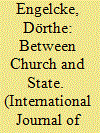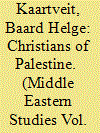| Srl | Item |
| 1 |
ID:
186578


|
|
|
|
|
| Summary/Abstract |
In most Middle Eastern jurisdictions, the applicable family law is determined based on the religious affiliation of the parties involved. Whereas Jordanian Islamic family law has last been reformed in 2001, 2010, and 2019, and the law that regulates the shariʿa courts has been amended several times since 1972, the family laws of Christian communities and the church courts have largely been exempted from this reform dynamic. Based on semi-structured interviews as well as the review of written sources, this article investigates why it is difficult to reform the church courts and even more difficult to reform the family laws of Christian communities, using the Greek Orthodox community in Jordan as a case study. I argue that conflicts within the Greek Orthodox Patriarchate of Jerusalem and the fact that the jurisdiction of the patriarchate over family law transcends Jordanian state boundaries have made state-led reform challenging and presented obstacles for Jordanian Christians lobbying for change.
|
|
|
|
|
|
|
|
|
|
|
|
|
|
|
|
| 2 |
ID:
126637


|
|
|
|
|
| Publication |
2013.
|
| Summary/Abstract |
Based on fieldwork in the Bethlehem area, this article uses the issue of internal land disputes as a starting point to describe a series of developments that have served to weaken the Christian communities in Palestine, and to identify some dilemmas they face, as Palestinians and as members of a minority community in Palestine. The article describes a situation where a weak and dysfunctional legal system under the Palestinian Authority (PA) has left Palestinians dependent on family and community networks for security and protection. Due to a history of emigration, combined with distinct social and demographic characteristics, Christian Palestinians find themselves in a position of structural vulnerability, subject to land theft and other criminal violation. Cautious about igniting sectarian divisions, Christian community leaders have a hard time addressing these issues within a public discourse. Fearful of harming Palestinian national interests, they are also reluctant to utilize international contacts and seek external support to secure their own rights and interests in Palestine. The article argues that this reflects both a commitment to an ethos of national unity among Christian Palestinians, and an acute awareness of the impact of 'framing' in preserving sectarian harmony.
|
|
|
|
|
|
|
|
|
|
|
|
|
|
|
|